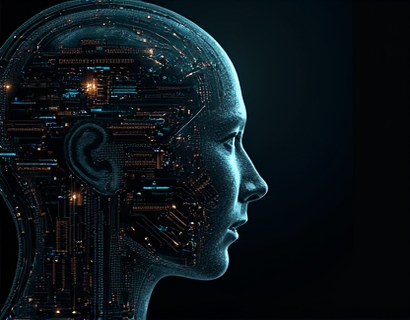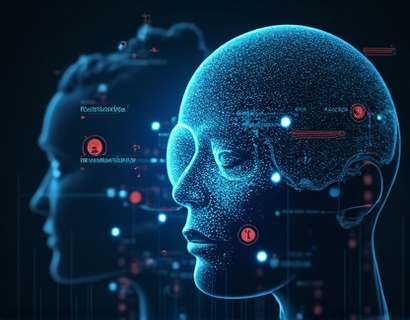AI-Driven Conflict Intelligence: Navigating Adversarial Challenges with Smart Chat Solutions
The landscape of conflict resolution is undergoing a transformative shift with the advent of AI-driven virtual platforms. These innovative tools leverage the power of artificial intelligence to provide personalized strategies and insights, empowering users to navigate and overcome complex adversarial situations with confidence and effectiveness. This shift is particularly significant in both personal and professional contexts, where conflicts can have far-reaching consequences. By harnessing the capabilities of advanced AI, individuals and organizations can gain a competitive edge in resolving disputes and fostering positive outcomes.
The core functionality of these AI-driven platforms revolves around creating a virtual environment where users can engage in simulated adversarial scenarios. This environment is designed to mimic real-world conflicts, allowing users to practice and refine their conflict resolution skills in a controlled setting. The AI component plays a crucial role by analyzing user interactions, providing real-time feedback, and suggesting tailored strategies to address specific challenges. This dynamic interaction not only enhances the learning experience but also builds the user's ability to handle adversarial situations effectively.
One of the key advantages of these AI-driven solutions is their ability to adapt to the unique needs of each user. Through machine learning algorithms, the platform continuously learns from user interactions, improving its recommendations over time. This adaptability ensures that the strategies and insights provided are always relevant and effective, regardless of the complexity of the conflict. Whether the user is dealing with a personal relationship issue or a high-stakes business dispute, the platform offers customized approaches that cater to the specific context and dynamics of the situation.
The process begins with the user engaging in a conversation with the AI, presenting the conflict or challenge at hand. The AI listens attentively, asking clarifying questions to fully understand the scenario. Based on this understanding, the AI generates a series of potential strategies and solutions. These suggestions are not generic but are tailored to the user's preferences, past behaviors, and the specific nuances of the conflict. The AI also provides explanations for each recommendation, helping the user grasp the underlying principles and rationale behind the suggested approaches.
For instance, in a professional setting, a manager might face a difficult decision regarding employee performance issues. The AI could suggest various strategies, such as conducting a performance review, providing targeted training, or facilitating a mediation session. Each option would be accompanied by an analysis of potential outcomes, considering factors like team dynamics, company culture, and legal implications. This comprehensive approach enables the manager to make an informed decision, confident in the knowledge that the recommended actions are well-considered and contextually appropriate.
In personal contexts, the AI can assist with relationship conflicts, conflict resolution in family settings, or even navigating complex social situations. For example, a user dealing with a strained relationship with a family member might receive suggestions such as initiating a mediated conversation, setting clear boundaries, or engaging in joint activities to rebuild trust. The AI's insights would consider emotional factors, communication styles, and historical patterns to propose strategies that are both practical and emotionally sensitive.
The AI-driven platform also includes a feature for role-playing simulations. These simulations allow users to practice their conflict resolution skills in a safe and controlled environment. The AI acts as both a participant and an observer, providing immediate feedback on the user's performance. This interactive learning method is particularly effective for building confidence and honing practical skills. Users can repeat simulations multiple times, experimenting with different approaches and observing the outcomes. This iterative process helps users refine their strategies and develop a more nuanced understanding of conflict dynamics.
Another significant benefit of these AI-driven tools is their ability to provide real-time support during actual conflicts. Users can access the platform on-demand, receiving instant guidance and support when needed most. This immediacy is crucial in high-pressure situations where timely intervention can make a significant difference. For instance, in a workplace dispute, a user can quickly consult the AI for advice on how to de-escalate a tense meeting or how to effectively communicate their concerns to a colleague or supervisor. The AI's rapid response and tailored recommendations can help de-escalate the situation and guide the user toward a constructive resolution.
The AI also incorporates advanced natural language processing (NLP) capabilities, enabling it to understand and interpret human language with high accuracy. This allows for more natural and intuitive interactions, making the platform accessible to a wide range of users, regardless of their technical expertise. The NLP engine can handle complex queries, interpret subtle nuances in language, and provide contextually relevant responses. This level of sophistication ensures that users receive accurate and helpful advice, even when dealing with emotionally charged or ambiguous situations.
Moreover, the AI-driven platform can integrate with other tools and systems, enhancing its utility and versatility. For example, it can connect with calendar applications to schedule mediation sessions, integrate with communication platforms for seamless messaging, or link to data repositories for comprehensive background information. This integration capability ensures that the conflict resolution process is streamlined and efficient, allowing users to focus on the core issues at hand.
The impact of AI-driven conflict intelligence extends beyond individual users to organizations and communities. In a corporate setting, such tools can be used to enhance team cohesion, improve leadership effectiveness, and foster a positive organizational culture. By providing employees with access to conflict resolution resources, companies can reduce the incidence of workplace conflicts, improve productivity, and create a more harmonious work environment. Similarly, in community settings, these tools can help mediate disputes, promote understanding, and build stronger social bonds.
From an educational perspective, AI-driven conflict intelligence platforms offer valuable learning opportunities. They can be used in academic settings to teach conflict resolution theories and practices, providing students with hands-on experience in a simulated environment. This practical approach complements traditional learning methods, helping students develop critical thinking and problem-solving skills that are directly applicable to real-world scenarios. Educators can also use these platforms to demonstrate the effectiveness of different conflict resolution strategies, reinforcing theoretical concepts with tangible examples.
In the realm of mental health, AI-driven conflict intelligence tools can serve as complementary resources for individuals seeking to manage stress and improve their emotional well-being. By providing structured approaches to conflict resolution, these tools can help users address underlying issues that contribute to conflict, such as communication barriers or unresolved grievances. The support offered by the AI can be particularly beneficial for those who may hesitate to seek traditional therapy due to stigma or accessibility issues.
Despite the numerous benefits, it is essential to acknowledge the challenges and limitations associated with AI-driven conflict intelligence. One primary concern is the potential for bias in AI algorithms, which can lead to skewed recommendations. To mitigate this risk, developers must prioritize transparency and fairness in AI design, regularly auditing and updating the algorithms to ensure they are unbiased and equitable. Additionally, while AI can provide valuable insights, it is not a replacement for human judgment and empathy. Users should view the AI's suggestions as tools to inform their decision-making process, rather than as definitive solutions.
Privacy and data security are also critical considerations. Users must trust that their sensitive information is handled with the utmost care and confidentiality. Developers must implement robust security measures and adhere to strict data protection standards to safeguard user data. Transparency about data usage and clear privacy policies are essential in building and maintaining user trust.
In conclusion, AI-driven conflict intelligence represents a significant advancement in the field of conflict resolution. By providing personalized strategies, real-time support, and interactive learning opportunities, these platforms empower users to navigate and overcome adversarial challenges with greater confidence and effectiveness. As the technology continues to evolve, it holds the potential to transform how conflicts are managed in both personal and professional spheres, fostering more harmonious and productive interactions.











































